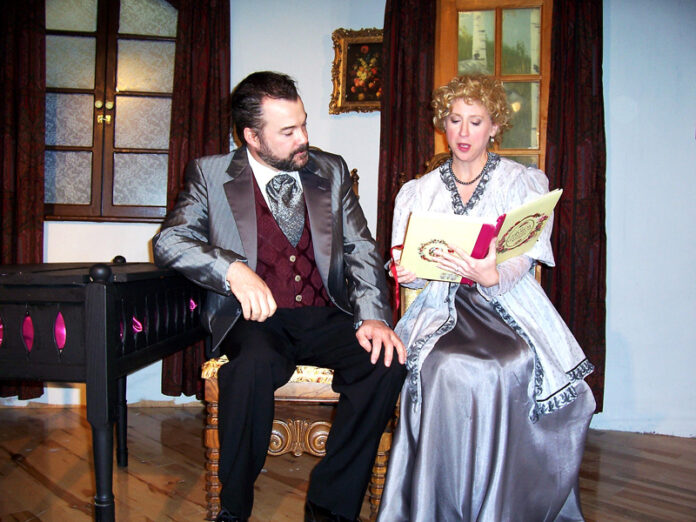
Marlow Ferguson, a former New York stage actor who founded the Star City Playhouse on Williamson Road along with his wife Karon Sue Semones, is busy prepping the theater for the second production of its current season, “Class Acts,” slated to run from November 27 to December 20. Based on the Gurney Norman stories “Kinfolks,” it was adapted by Ferguson’s wife, in collaboration with Norman.
The latter, Ferguson says, “just loves it and, knock wood, we’re hoping Gurney will come out here and see this production. We’ve tacked on, as a second act, the funniest play I’ve ever seen,” Robert Anderson’s “I’m Herbert.” The latter, a one-act work, “just seems to fit into the ‘Class Acts’ that we wanted to create — a light-hearted, hilarious Christmas show.”
Star City Playhouse has already presented its initial production of the season, Tennessee Williams’ “Cat On a Hot Tin Roof,” a play Ferguson says is seldom performed now. Ferguson believes that the universities teach Shakespeare “and what was written last week – and they don’t teach anything in between.” The classic playwrights–Chekhov, O’Neill, Arthur Miller, Tennessee Williams, etc.–“are ignored today.”
Next up on the playhouse schedule after “Class Acts” is “Awake and Sing.” Written by Clifford Odets and scheduled for February, “Awake and Sing” is a play many people have heard of, Ferguson says, but one he believes hasn’t been performed in Virginia. He feels it is quite timely.
“Clifford Odets wrote it in 1935, in the middle of a depression, and I thought, ‘Well, we’re in the middle of a depression. Let’s have a Depression–era comedy and see if it goes over.’ I think it will. It’s a brilliant, heart-grabbing play.” The season then concludes with a production penned by Ferguson’s wife, “Grave Concerns,” which Ferguson characterizes as “a very funny play. It’s about a little theater…the director dies and they decide they’re going to put on a performance to give him a send-off, a memorial performance, which turns out to be hysterical.”
Looking ahead to next year, Ferguson believes they’ll do some more Tennessee Williams works. “I have a list of 350 plays and cutting them down is quite a hard job. A lot of people give me suggestions, and some of them are just wonderful. They’d send me rushing to my library to reread plays that they give me. But it will be plays that you can take your grandmother to, and you can take your granddaughter to, and neither of them will be offended or shocked. They may be surprised, as you should be in theater, but they won’t be shocked.”
In addition to presenting productions by classic playwrights with integrity and high standards, Star City Playhouse trains young actors who may be thinking about making acting their career. It also provides a place for older actors who don’t want to travel and who have families, in order to, in Ferguson’s words, “keep sharp, to keep them on stage. All the talent that we use is from here, from the valley, and we’re delighted.”
As for as the cultural scene in Roanoke, Ferguson believes that while there are wonderful amenities such as the orchestra and the opera, “the problem is you have to hunt for these things.” Regarding the opening of Star City Playhouse several years ago (after completing major renovations to a building the couple purchased), “we thought that we would be working hand and glove with Mill Mountain. And, suddenly, right after we opened, Mill Mountain disappeared, which shocked us.”
Ferguson estimates that fifty to sixty percent of Star City Playhouse’s current audience originally attended Mill Mountain productions. “We’re delighted to have them, but I certainly wish Mill Mountain were back in the sense of a beloved old grandfather.”
Calling it “an institution,” Ferguson notes, “When I was in New York, there wasn’t an actor I knew who wouldn’t give his eye-tooth to come down here in Roanoke and work at Mill Mountain. That’s how highly Mill Mountain was thought of.”
Roanoke’s professional Equity Theater was, in Ferguson’s view, “skunked” by the city when the decision was made to open up the Performing Arts Center for traveling Broadway musicals – a decision that, in his words, “cut the legs out from under Mill Mountain.” He called MMT a League of Regional Theaters (LORT) institution, which made its money from musicals.
With that, “Mill Mountain began to die. This city has to make up its mind: Does this city want to be homegrown or does it want to be like everywhere else? And there’s so much here that’s lovely that’s homegrown, I can’t see [Roanoke civic officials] throwing it away.”
The Taubman art museum for example, resembles “a beautiful bird” that could have landed anywhere but “just happened to land in Roanoke. It didn’t grow here – the city had Mill Mountain, which grew here for the last fifty years, and didn’t know how to cultivate it. [The City] let it die. They don’t know the value of what they have.”
Further information concerning Star City Playhouse’s current season can be obtained by calling 366-0060, or by visiting www.starcityplayhouse.org.
By Melvin E. Matthews, Jr. [email protected]

Cost of tickets?